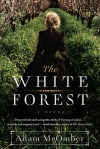Among the countless “best of 2012” lists out there, Laura Miller’s recent piece for Salon, “Five Books I Bailed On in 2012” caught my attention. Every serious reader I know, myself included, has given up on a book before. Some of us feel unreasonable guilt about this; some will only give up right away, or not at all; some force themselves to read at least halfway before jumping ship. But, we try to convince ourselves, we are reading for pleasure. No one is forcing us to finish every book we start, and in fact, isn’t our time better spent finding and reading books we truly enjoy?
These unfinished books linger in limbo, on our “partially-read” or “on the back burner” shelves on Goodreads. Maybe we’ll return to them someday; some of them we’ll never open again. I consulted my own shelf of unfinished books to make a “books I bailed on” list like Laura Miller’s. I should note that (a) these were books I started in 2012, not necessarily books that were published in 2012, and (b) the experience of reading is, of course, entirely subjective; feel free to disagree with my opinions.

 Landing Light by Don Paterson and Here, Bullet by Brian Turner.
Landing Light by Don Paterson and Here, Bullet by Brian Turner.
These volumes have nothing in common except that they are both books of poetry that I ordered from the library. However, I find it necessary to read poems in small doses; I’ve never read a book of poems straight through, because I need time to absorb and reflect. But then I put the book down and pick up something else…and then it’s time to return it to the library. (This is why I prefer owning books of poetry rather than borrowing them.) A more disciplined approach – one poem a night before bed, or one every morning before getting up – is a great idea in theory, but not one I’ve been able to pull off. However, the fact that I didn’t finish these books doesn’t mean I didn’t like them; I’d recommend both.
Paterson is a Scottish poet; Turner is an American soldier who fought in Iraq and who holds an MFA from the University of Oregon. I first read about Landing Light in the New York Times and the poem included in the article, “Luing,” is one of my favorites, especially the last three lines. I discovered Here, Bullet via the Times as well; I collected fragments from various poems in the collection in my Goodreads review.
 Girls in White Dresses by Jennifer Close
Girls in White Dresses by Jennifer Close
I was tricked into picking this up by the flap copy (which made it sound like literary fiction instead of chick lit) and inexplicably good reviews (“genuinely empathetic…richly satisfying” –Booklist, “modern and funny…original” –Library Journal, “artfully spare prose” –Publishers Weekly). I found it to be frustratingly superficial, and put it down after 47 pages.
 Would It Kill You to Stop Doing That: A Modern Guide to Manners by Henry Alford
Would It Kill You to Stop Doing That: A Modern Guide to Manners by Henry Alford
I enjoyed this, but was eager to move on to other books. Alford is intelligent and pleasant to read, but if you have to choose between this rant on manners and Lynn Truss’ excellent Talk to the Hand, I’d recommend the latter.
 The White Forest by Adam McOmber
The White Forest by Adam McOmber
This book’s flap copy, cover, and reviews all drew me in; it looked like exactly the kind of book I would like, if not love. Yet after 15 pages, I wasn’t drawn into the story or compelled by the characters. I may pick it up again in the future – maybe it was just one of those “right book at the wrong time” cases – but probably not.
 The Dovekeepers by Alice Hoffman
The Dovekeepers by Alice Hoffman
This is one I may come back to at some point. I’ve liked Alice Hoffman’s books in the past (Practical Magic, The Story Sisters), and I didn’t dislike this one; it just didn’t grab me, and I had a few other books I was more excited about reading at the time.
 Telegraph Avenue by Michael Chabon
Telegraph Avenue by Michael Chabon
This is the big one. With the exception of Wonder Boys, I have loved every Michael Chabon book I’ve read, and so I had high hopes for Telegraph Avenue, and yet, on page 199, I threw in the towel. The bones of a good story are there, and the foundations of good characters; I especially liked Aviva and Gwen, the wives of the two main adult male characters, and main characters in their own right. I’m also sympathetic to the plight of independent stores to big corporate stores (as are many of Chabon’s readers, I suspect). So why did I put it down? It seemed as though the writing, instead of revealing the story, was obscuring it. I’m all for writing that is both intellectual, colorful, and poetic, but this was just too over the top for me. It was with regret but also relief that I put it down unfinished.
Agree? Disagree? What books linger on your back burner?
Cross-posted on the Robbins Library blog.
Edited to add: Tim Parks wrote an article (“Why Finish Books?”) for the New York Review of Books blog on March 13, 2012 that touches on a different aspect of the “to finish or not to finish” question. Parks clearly agrees that if you are not enjoying a book, it is perfectly okay to stop reading and pick up a book you will enjoy instead; however, he also posits that some readers might stop reading books that they are enjoying, and that does not necessarily mean that the book was bad or that the reader didn’t like it, just that the reader had had enough. It is an interesting article, whether or not you agree. -4/18/13






